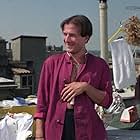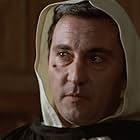Il commissario di polizia Santamaria sta indagando sull'assassinio dell'ambiguo architetto Garrone. Le indagini lo portano presto verso l'alta società torinese ma i risultati sono poco chiar... Leggi tuttoIl commissario di polizia Santamaria sta indagando sull'assassinio dell'ambiguo architetto Garrone. Le indagini lo portano presto verso l'alta società torinese ma i risultati sono poco chiari, e succede un altro omicidio.Il commissario di polizia Santamaria sta indagando sull'assassinio dell'ambiguo architetto Garrone. Le indagini lo portano presto verso l'alta società torinese ma i risultati sono poco chiari, e succede un altro omicidio.
- Regia
- Sceneggiatura
- Star
- Premi
- 2 vittorie totali
- Nicosia
- (as Renato Cecilia)
- Paolo Campi
- (as Antonino Faa' di Bruno)
Recensioni in evidenza
giallo.
In Turin, dirty old man/architect Garrone goes about his daily business of looking up woman's skirts, making optimistic passes at young waitresses, and ruining high class are exhibitions. Meanwhile, bored housewife Anna is tuning out her older husband ramblings and thinking about a pointless argument she's having with her possible lover Massimo (Jean-Luis Trintigant). They are arguing about how to pronounce the word Boston, by the way, and this architect Garrone has stuck his nib in about it. Clearly venting, Anna writes a letter where she thinks Massimo and herself should kill Garrone.
Garrone ends up being beaten to death by a giant stone phallus and Anna regrets writing that letter as her two newly-fired house staff take the letter to the police. The man in charge of the case is Marcello Mastrioanni and he's a bit uncomfortable with this whole upper class thing. The bored Anna and the even more bored Massimo start treating the whole thing like a game and start doing their own investigations.
Complicating things further is the revelation that Massimo isn't Anna's lover, as he's in a turbulent gay relationship Lello. While it's refreshing to see an actual gay relationship in an Italian movie from this era, rather than a man in drag battering policeman with a handbag and screaming that he's all woman, these two bicker like fiends and you wonder what Lello is thinking when he also starts his own investigation into the murder to save his relationship with Massimo.
The more Marcello digs, the more dirt he finds as it seems that no one has an alibi and everyone seems to be up to something. He now also has to contend with two eccentric sisters who have trouble with hooker using their garden for business, a mysterious car that's following people around and a stonemason business that specializes in stone phalluses
There's not a great deal of murder here but plenty of mystery, and Marcello Mastrioanni's laid back, bemused cop wanders through a world he doesn't understand, with a few sidekicks, many, many meals, and plenty of discussion about Sicilians, Sardinians, and Piedmontians. It's quite a long film for a giallo and even though it's trash free, my mind didn't wander at all while watching it.
Nice Ennio Morricone soundtrack too - but do i have to say that?
If you are looking for suspense or you are not familiar with Italian society, you should stay away from it. Also, I recommend that you need to understand Italian very well to appreciate this movie: I checked a bit the German version/subtitles, but at least 50% of the humor gets lost in the translation...
The description of this high society which is complaining about the criminality, trying to speak in English , speaking about their holidays and sending their children to Switzerland for their education is quite fine and maybe more interesting that the investigation itself.
I enjoyed the performances of Marcello Mastrioanni, Jean-Louis Trintignant , Aldo Reggiani, Jacqueline Bisset and Claudio Gora.
Jacqueline Bisset (yes, that Jacqueline Bisset) plays a wealthy wife of an aristocrat whose philandering husband ignores her nightly, and despite their young daughter, she's quite bored with her life since there are servants and nannies to meet her every whim. Anna Carla in true Mid-Century socialite fashion is besties with a gay man, Massimo, and they ingratiate themselves into a murder mystery that accidentally involves them due to a misinterpreted letter by two recently fired servants.
Bisset is decked out like it's 1955 with carefully curled short hair and tailored dresses, which sets the tone for the entire story. It's one of the most boring mysteries I've seen to come out of Italy from the time period, likely due to its attempts to mimic Hollywood films from a good 15-20 years prior.
Lo sapevi?
- QuizThe first 10 notes of the first and second lines, with the first 8 of the last line of the jaunty whistling theme in the score, along with their chord progressions, are identical to the chorus of the pop hit from the previous year, "Billy Don't be a Hero" by Murray & Callendar, but with the lines cut short.
- BlooperWhile Commissioner Santamaria and Anna Carla talk in the park, a microphone is repeatedly seen over the top of the camera.
- Citazioni
Commissioner Salvatore Santamaria: [to Anna Carla, in bed] Tabusso came clean at the precinct. You know what she said? "A pig and a pederast deserve nothing less."
- ConnessioniFeatured in V.I.P.-Schaukel: Episodio #6.3 (1976)
- Colonne sonoreCentomila violoncelli
Written by Mario Casacci, Alberto Ciambricco, Leonardo Cortese
Performed by Italo Janne
I più visti
- How long is The Sunday Woman?Powered by Alexa
Dettagli
- Data di uscita
- Paesi di origine
- Lingue
- Celebre anche come
- The Sunday Woman
- Luoghi delle riprese
- 37 Via Cesare Balbo, Torino, Piemonte, Italia(Garrone's home)
- Aziende produttrici
- Vedi altri crediti dell’azienda su IMDbPro
- Tempo di esecuzione1 ora 49 minuti
- Mix di suoni
- Proporzioni
- 1.37 : 1
Contribuisci a questa pagina



























